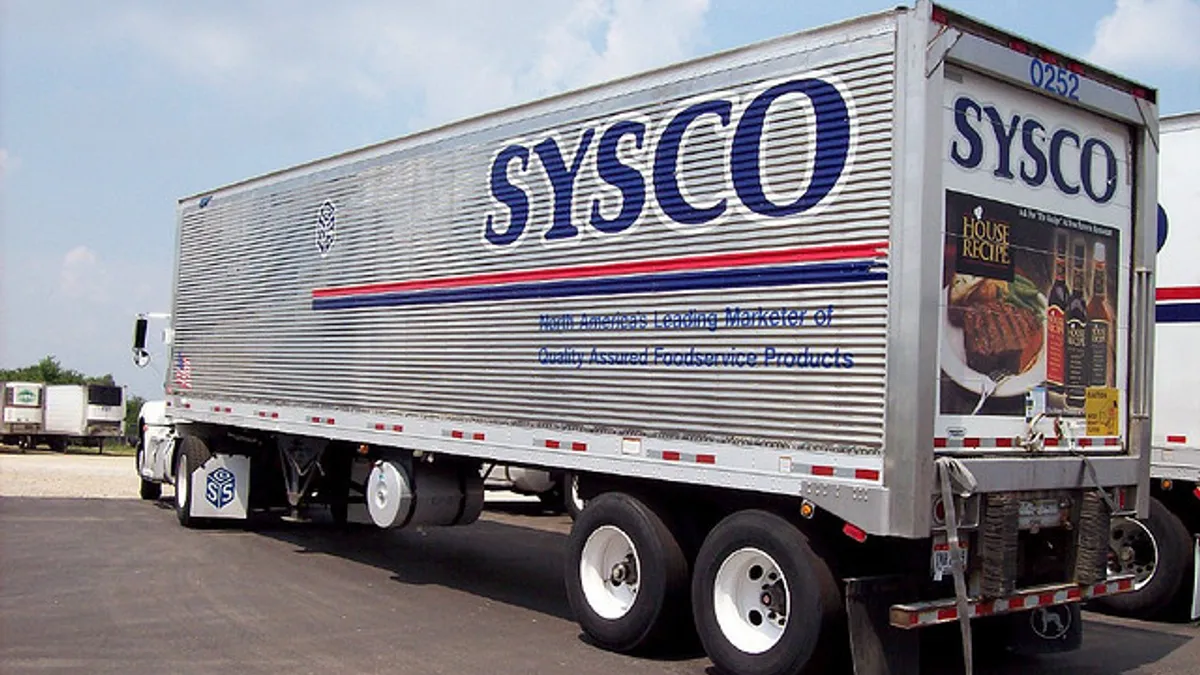Dive Brief:
- Sysco is testing an all-electric Daimler Freightliner eCascadia, the food-service company said on Wednesday. Sysco, which runs the second-largest private fleet in the nation, said it is seeking to reduce its carbon footprint.
- The electric Class 8 tractor is making local and regional trips out of a San Francisco terminal, and will continue test runs through January, Sysco said. The test runs help Daimler, too, as Sysco said it is sending data and feedback to the OEM to assist in improving the design.
- Sysco said it is participating in Daimler's Freightliner Electric Vehicle Council, "a group of customers working with Freightliner to identify and address all potential hurdles to large-scale deployment of commercial battery electric vehicles." Daimler is North America's largest truck maker and announced in April 2019 that it would focus on battery-electric trucks, and not fuel-cell technology, claiming battery-electric was the best path to achieve that goal.
Dive Insight:
Private fleets are under pressure from state governments and consumers to adopt zero-emission methods for deliveries. But private-fleet interest now could also be a bit of a hedge. Gary Petty, CEO and president of the National Private Truck Council, said if diesel price doubles, "you'd see a quadrupling in interest in electrification."
Sysco joins PepsiCo and other large peers in adding battery-electric trucks to its fleet. PepsiCo, owner of the largest private fleet in North America, added 15 Tesla Semi trucks to replace all of its diesel trucks at its Frito-Lay plant in Modesto, California, according to Electrek. Walmart, with its third largest North American fleet, said in September it would eliminate its transport emissions by 2040. In September, Walmart Canada tripled its order of Tesla trucks to 130 units, according to Morgan Stanley.
Private fleets are kicking the tires and testing electric trucks because they seem suited to short trips or shorter regional trips, which is ideal for fleets, such as PepsiCo's, that deliver beverages and food from production facilities to nearby warehouses.
Electric trucks have to be recharged, and the maximum range now is about 200 miles, according to Mike Roeth, executive director of the North American Council for Freight Efficiency, speaking to Transport Dive in February.
In the back of fleets' minds, though, is what happened with natural gas 10 years ago, Petty said. Industry officials promoted natural gas as a low-emissions fuel that could address the problems of climate change and regulation, Petty said. But as time went on, few companies added natural gas models to their private fleets.
One of the reasons was unforeseen problems with engines and maintenance. Problems ranged from increased electrical power usage to maintaining the temperature of liquefied natural gas, according to a panel covered by Heavy Duty Trucking in 2014. Eventually, trucking began to look more and more at electric trucks as a solution, said Petty.
Petty said fleets will try out the electric equipment with limited orders, at first. That way fleets can get an idea of what to expect in terms of maintenance and cost.
"I think it's a long game," said Petty.














